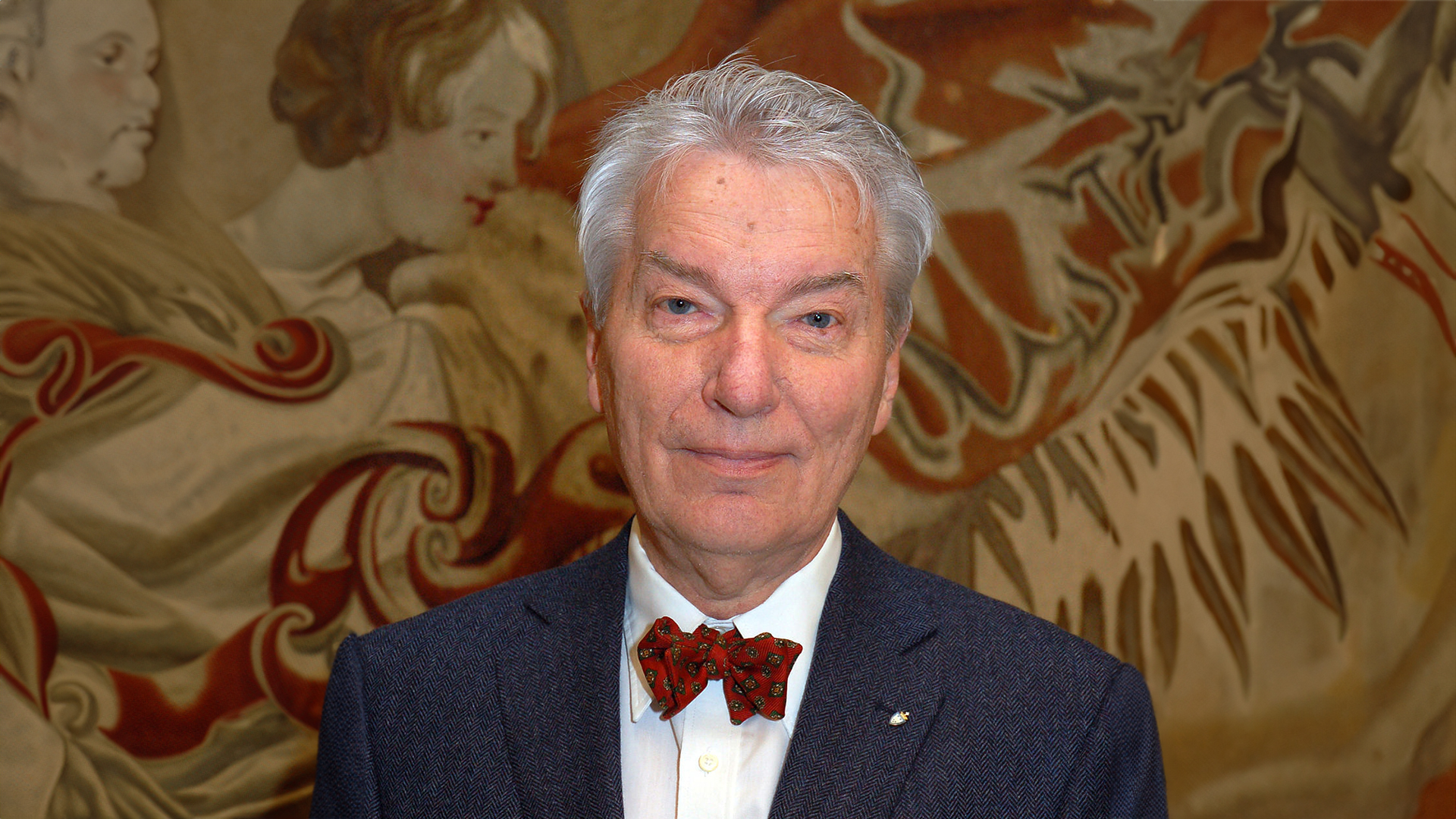Szilveszter E. Vizi, Doyen of the HUN-REN President's Circle, Achieves New Research Breakthrough with Richter Pharmaceuticals
A research paper, with Professor Szilveszter E. Vizi as the corresponding author, has been published in the leading international journal of pharmaceutical research. Professor Vizi, the iconic former President of the Hungarian Academy of Sciences (HAS), has recently become the Doyen of the HUN-REN President's Circle personal advisory group. We asked him about his new role, his latest publication, and the ongoing renewal of HUN-REN.

Source: Wikipedia
A study with Pál Tod as the lead author and Szilveszter E. Vizi as the corresponding author has been published in the prestigious British Journal of Pharmacology. Third-generation antipsychotics, commonly used to treat schizophrenia and major depression, can cause involuntary hyperkinetic movement disorders as an unpleasant side effect, making it difficult for patients to integrate into their communities. Based on reliable clinical data, these side effects are treated with tetrabenazine, a drug approved by the US Food and Drug Administration (FDA). However, there is very limited information on how this class of compounds affects different brain regions. Researchers from the HUN-REN Institute of Experimental Medicine (HUN-REN IEM) and Richter Gedeon Plc. have been the first to clarify this issue in a recent study. (The authors provide further insights into the scientific background of the research on the HUN-REN IEM website.)
Collaborations and lots of patents needed
In response to a question about the publication, Szilveszter E. Vizi emphasised the importance of having their findings published in such a prestigious journal, as it allows other researchers to build on their ideas. He noted that, in his view, science is "built through collective effort." Professor Vizi also highlighted a unique message from their recent work: "Researchers from one of HUN-REN's institutes collaborated on this study with colleagues from one of Hungary's largest and arguably most important multinational companies. It's significant when a Hungarian researcher can work locally with a national research institute and key players in national industry, as it is only through Hungarian intellectual capital that profits can remain in the country. Otherwise, we are largely just subcontractors employed by foreign companies. In this sense, our collaboration with Richter could serve as an example for many. It is also a model for HUN-REN, demonstrating that through effective local partnerships, it can become not only a more successful research network but also a significant financial contributor to the Hungarian economy on the international stage."
Commenting on the prestigious publication, Professor Vizi said that HUN-REN IEM has always been considered a flagship of Hungarian research: its researchers consistently achieve outstanding results, rank among the most successful in securing major EU grants, and have a long-standing collaboration with the pharmaceutical company Richter Gedeon. "HUN-REN IEM's research and findings are embedded in Richter's successful medicines," he added.
In terms of the partnership with the pharmaceutical company, Professor Vizi cited the success of Richter’s compound, cariprazine—a third-generation antipsychotic used to treat schizophrenia. Patent royalties from this drug generate substantial revenue for Hungary and, of course, for the company itself. He emphasised that increasing the number of patents in Hungary is crucial to securing higher domestic profits. This drug, used to treat schizophrenia and depression, is marketed by AbbVie, the world’s third-largest US company, with a market capitalisation seventy times that of Richter. AbbVie recently signed a collaboration and research agreement with Richter to develop new drugs targeting the central nervous system. “It is like Gulliver teaming up with the Lilliputians, so I consider this collaboration to be of immense importance,” the HUN-REN IEM Professor stressed.
Professor Vizi went on to say that he has dedicated his life to pharmaceutical research, which has given him the opportunity to witness the transformation of original ideas into products. "It’s a very important process, but it’s unrealistic to expect a basic researcher to deliver a finished product. However, we can expect them to develop patentable ideas that can then be advanced along the translational pathway to become truly Hungarian products. Unfortunately, I see a year-on-year decline in the number of patents filed in Hungary, but this can be reversed with smart research organisation and professional support for researchers."
Supporting the renewal of HUN-REN
Professor Balázs Gulyás, President of HUN-REN, established the HUN-REN President's Circle as one of his first initiatives following his appointment, after returning home from a successful career spanning several decades in international research and science organisation. He appointed Professor Sir George Radda to head the Circle. The President's Circle is an international group of personal advisors to the President, including Professor Sierd Cloetingh, former President of the Academia Europaea; Nobel Laureate Konstantin Novoselov; Lord Martin Rees, former President of the Royal Society; world-renowned plant biologist Éva Kondorosi; former Spanish Minister of Finance and Knowledge Andreu Mas-Colell; and many others. Drawing on their extensive experience in academia, research, and science policy, they provide strategic advice to support the President's activities. Following Professor Radda's passing, President Gulyás invited Szilveszter E. Vizi, a member of the President's Circle since its inception, to lead this distinguished advisory group of world-renowned members. "It is an extraordinary honour and a truly unique experience to lead this group," the new Doyen remarked.
"Professor George Radda was a fellow Benedictine student of mine, and with his recent passing, this position became vacant. Although I have always been a member of the Circle, this is now a completely different situation, as opinions and criticisms need to be expressed in a way that can be supported by such an internationally recognised group. By selecting the members of the President's Circle, Professor Gulyás has elevated the reputation of Hungarian science to the highest level, and at the same time, it is a tremendous challenge to meet the expectations," said Szilveszter E. Vizi.
We must become a world-renowned research network
"Balázs Gulyás, President of HUN-REN, has set a clear goal, on behalf of the Presidential Advisory Board and the research community, to establish and operate a research network that is not only significant nationally but also globally. This requires securing the necessary human and financial resources, as well as gaining the support of the scientific community. Although we are surrounded by excellent researchers who are valuable, we must support them, or we risk running out of time. Efforts are currently underway to gain social and political acceptance for this endeavour," added Szilveszter E. Vizi, commenting on the ongoing renewal of HUN-REN.
"Unfortunately, the financial recognition for our researchers still lags far behind the salaries of those working in the world’s leading scientific communities. If this does not change, our best researchers will leave. I believe that a huge responsibility now lies with the relevant ministries and legislators," stressed Szilveszter E. Vizi. He added that if the budget for the research network is not immediately and significantly increased, along with the financial resources and additional funding that would allow the institutes to manage independently, and if HUN-REN does not allocate funds based on performance, the stability and effectiveness of the institutional network will be compromised.
The new Doyen of the President's Circle expressed his firm belief that the group fully supports this 'preserve and elevate' approach. According to Professor Vizi, only science matters, and science is international. "That is why we must also achieve excellence by international standards. Our two new Nobel Laureates have demonstrated that we are capable of producing world-class scientists, but taking a Hungarian discovery to the global market is not an easy challenge. Bringing a drug to the global market costs at least one to two billion dollars and involves enormous risks. In Hungary, this can only be accomplished with the support of international capital. In other words, original Hungarian ideas must become patents ready to be adopted by the global market. So, I can only repeat myself: more and more patents must emerge from HUN-REN,' stressed the research professor.
"I worked abroad for many years in several countries. At Oxford, Sir William Paton was my supervisor, and he taught me how to think. HUN-REN is full of exceptional individuals who can guide talented young researchers in developing the critical thinking skills needed to achieve results, make discoveries, and uncover something new. This is why HUN-REN must receive additional support immediately, so that the most talented young people we have already trained to think and discover will choose to stay in Hungary. If this does not happen and they leave, the responsibility will lie with those who fail to provide this support," stressed Szilveszter E. Vizi, the new Doyen of the HUN-REN President's Circle and former President of the Hungarian Academy of Sciences.

